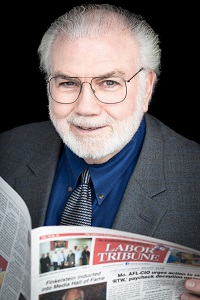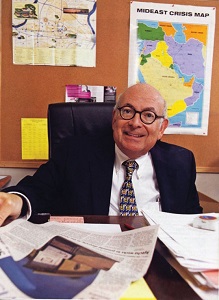Print HOF
Finkelstein, Ed
 Ed Finkelstein – 2012
Ed Finkelstein – 2012
Ed Finkelstein was recruited by Maury Ruben, the founder of the Labor Tribune, in the early 1970s to become the paper’s second publisher, a position he held for several decades.
Finkelstein, a public relations practitioner, was the founder of Union Communications, one of the first labor-focused public relations firms in America. Later, as UNICOM. that firm served educational institutions and specialized in issue-oriented campaigns. Through his early PR work, he helped give a voice to organized labor by telling its story to the public and its own members. As an aggressive newspaper publisher, Finkelstein oversaw the coverage of major union issues as well as investigative pieces that scooped St. Louis’ major media outlets.




